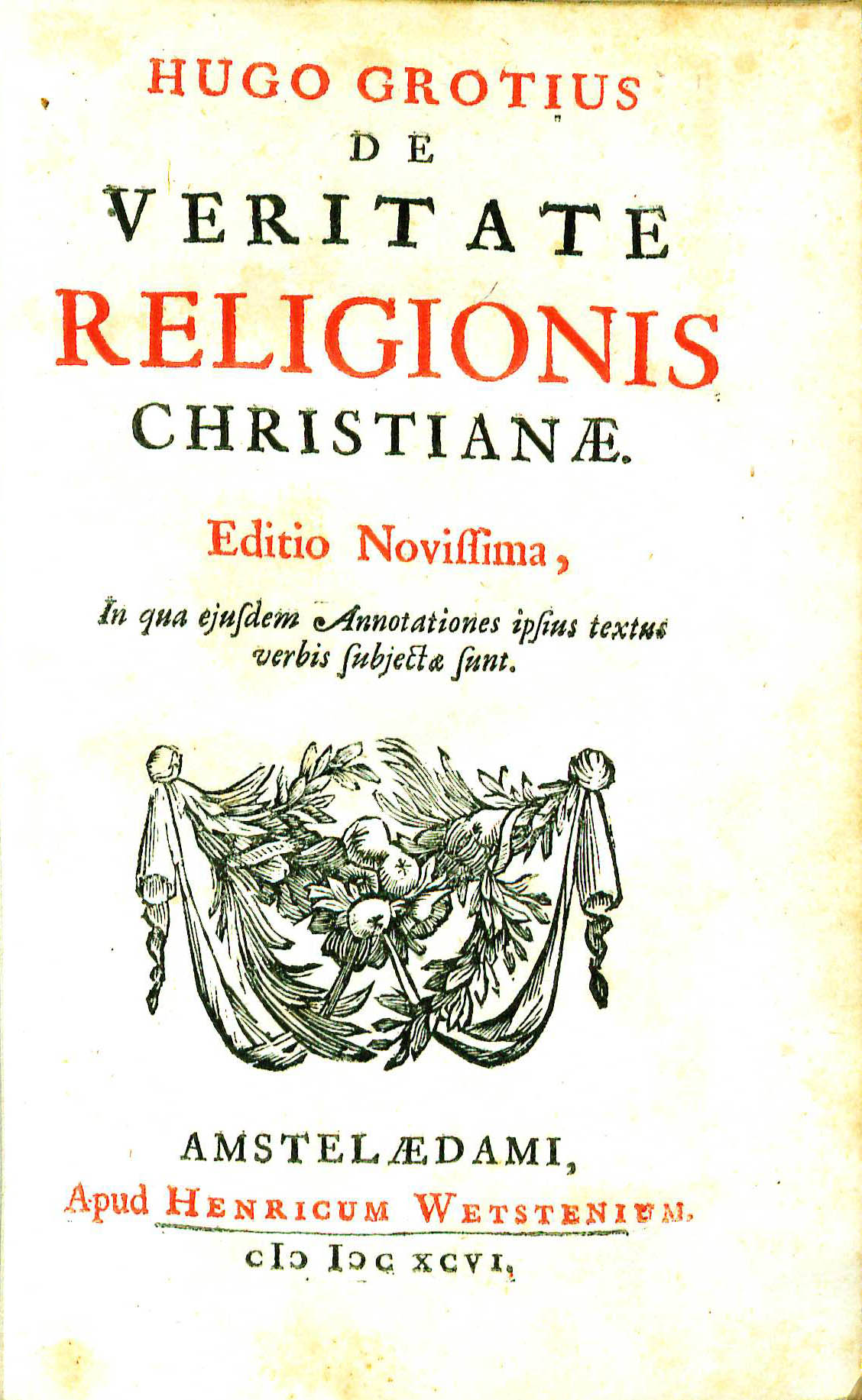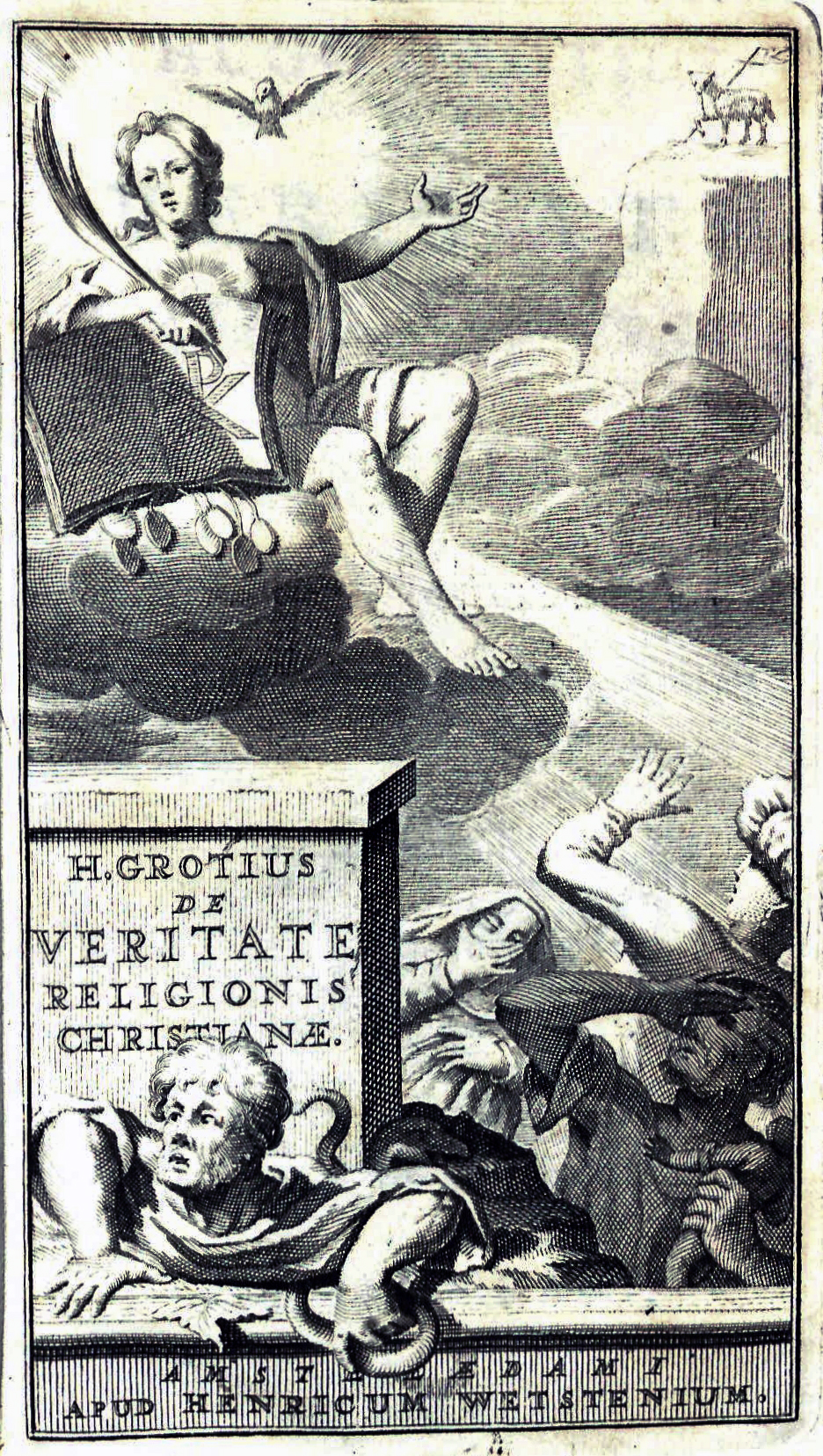Difference between revisions of "De Veritate Religionis Christianae"
(→Description of the Wolf Law Library's copy) |
m |
||
| (11 intermediate revisions by 6 users not shown) | |||
| Line 1: | Line 1: | ||
| − | {{DISPLAYTITLE:''De | + | {{DISPLAYTITLE:''De Veritate Religionis Christianae''}} |
===by Hugo Grotius=== | ===by Hugo Grotius=== | ||
| − | |||
{{BookPageInfoBox | {{BookPageInfoBox | ||
|imagename=GrotiusVeritateReligionisChristianae1696TitlePage.jpg | |imagename=GrotiusVeritateReligionisChristianae1696TitlePage.jpg | ||
| − | |link=https:// | + | |link=https://wm.primo.exlibrisgroup.com/permalink/01COWM_INST/g9pr7p/alma991025004899703196 |
|shorttitle=De Veritate Religionis Christianae | |shorttitle=De Veritate Religionis Christianae | ||
| − | |author=Hugo Grotius | + | |author=[[:Category:Hugo Grotius|Hugo Grotius]] |
|edition=Editio novissima | |edition=Editio novissima | ||
| − | |lang=Latin | + | |lang=[[:Category:Latin|Latin]] |
| − | |publoc=Amstelaedami | + | |publoc=[[:Category:Amsterdam|Amstelaedami]] |
|publisher=Apud Henricum Wetstenium | |publisher=Apud Henricum Wetstenium | ||
|year=1696 | |year=1696 | ||
|pages=[8], 296 | |pages=[8], 296 | ||
| − | |desc=8vo (16 cm.) | + | |desc=[[:Category:Octavos|8vo]] (16 cm.) |
| − | |shelf=B- | + | |shelf=B-2 |
| − | }}[[ | + | }}[[wikipedia:Hugo Grotius|Hugo Grotius]] (1583 – 1645) is often touted as the "Father of International Law."<ref>Sean Murphy, ''Principles of International Law'', (Minnesota: Thompson West, 2006), chap. 3.</ref> Grotius influenced thinkers like [http://en.wikipedia.org/wiki/John_locke John Locke] with his ideas of international law as natural law, or principles derived inherently from the human nature or human reason.<ref>Jeremy Waldron, ''God, Locke, and Equality: Christian Foundations in Locke's Political Thought'', (Cambridge: Cambridge University Press, 2001), 189.</ref> Grotius also wrote extensively on maritime law and the law of war. |
| − | + | ||
| − | < | + | [[File:GrotiusDeVeritate1696Illustration.jpg|left|thumb|350px|<center>Half-title.</center>]] |
Grotius composed a poem titled "Bewijs van den waren godsdienst" in a prison cell in 1620 after having been arrested by Prince Mauris.<ref>Jeremiah Hackett, reviewer, "''Hugo Grotius as Apologist for the Christian Religion: A Study of His Work "De Veritate religionis christianae" (1640)'' by J. P. Heering; J. C. Grayson,” ''The Sixteenth Century Journal'' 38, no. 1 (Spring 2007): 164.</ref> This didactic poem, whose title translates as "Proof of the True Religion," was first published in 1622 as a defense of Christianity against other religions and atheism.<ref>Ibid.</ref>The Latin version of this poem, ''De Veritate Religionis Christianae'' ("On the Truth of the Christian Religion"), was later published in 1640.”<ref>Ibid.</ref> The work contains six "books" with the first three touting the merits of Christianity, and the last three attacking paganism, Judaism, and Islam, respectively.<ref>Ibid.</ref> | Grotius composed a poem titled "Bewijs van den waren godsdienst" in a prison cell in 1620 after having been arrested by Prince Mauris.<ref>Jeremiah Hackett, reviewer, "''Hugo Grotius as Apologist for the Christian Religion: A Study of His Work "De Veritate religionis christianae" (1640)'' by J. P. Heering; J. C. Grayson,” ''The Sixteenth Century Journal'' 38, no. 1 (Spring 2007): 164.</ref> This didactic poem, whose title translates as "Proof of the True Religion," was first published in 1622 as a defense of Christianity against other religions and atheism.<ref>Ibid.</ref>The Latin version of this poem, ''De Veritate Religionis Christianae'' ("On the Truth of the Christian Religion"), was later published in 1640.”<ref>Ibid.</ref> The work contains six "books" with the first three touting the merits of Christianity, and the last three attacking paganism, Judaism, and Islam, respectively.<ref>Ibid.</ref> | ||
| − | + | ||
==Evidence for Inclusion in Wythe's Library== | ==Evidence for Inclusion in Wythe's Library== | ||
| − | Listed in the [[Jefferson Inventory]] of [[Wythe's Library]] as | + | Listed in the [[Jefferson Inventory]] of [[Wythe's Library]] as "Grotius de veritate religionis Christianae. 8vo." and given by [[Thomas Jefferson]] to his son-in-law, [[Thomas Mann Randolph]]. Later appears on Randolph's 1832 estate inventory as "'Grotius on Christ: Religion (latin)' ($1.50 value)." We do not have enough information to conclusively identify which edition Wythe owned. [http://www.librarything.com/profile/GeorgeWythe George Wythe's Library]<ref>''LibraryThing'', s. v. "[http://www.librarything.com/profile/GeorgeWythe Member: George Wythe]," accessed on November 13, 2013.</ref> on LibraryThing indicates this without naming a specific edition. The [https://digitalarchive.wm.edu/handle/10288/13433 Brown Bibliography]<ref> Bennie Brown, "The Library of George Wythe of Williamsburg and Richmond," (unpublished manuscript, May, 2012) Microsoft Word file. Earlier edition available at: https://digitalarchive.wm.edu/handle/10288/13433.</ref> lists the 1745 duodecimo edition published in Glasgow. Jefferson listed the volume as an octavo, but we do not know the precise edition owned by Wythe. The Wolf Law Library purchased a copy of the 1696 octavo edition published in Amsterdam. |
==Description of the Wolf Law Library's copy== | ==Description of the Wolf Law Library's copy== | ||
Bound in contemporary vellum with manuscript title and "626" or "bzb" on spine. Purchased from Daniel Thierstein. | Bound in contemporary vellum with manuscript title and "626" or "bzb" on spine. Purchased from Daniel Thierstein. | ||
| − | View the record for this book in [https:// | + | Images of the library's copy of this book are [https://www.flickr.com/photos/wolflawlibrary/sets/72157637877672174 available on Flickr.] View the record for this book in [https://wm.primo.exlibrisgroup.com/permalink/01COWM_INST/g9pr7p/alma991025004899703196 William & Mary's online catalog.] |
| + | |||
| + | ===Full text=== | ||
| + | <div style="overflow: hidden;"> | ||
| + | *[http://lawlibrary.wm.edu/wythepedia/library/GrotiusDeVeritateReligionisChristianae1696.pdf ''De Veritate Religionis Christianae''] (10MB PDF) | ||
| + | </div> | ||
| + | |||
| + | |||
| + | [[File:GrotiusDeVeritate1696Illustration2.jpg|center|thumb|600px|<center>Headpiece, first page of text.</center>]] | ||
==See also== | ==See also== | ||
*[[George Wythe Room]] | *[[George Wythe Room]] | ||
| + | *[[Jefferson Inventory]] | ||
*''[[Rights of War and Peace|The Rights of War and Peace]]'' | *''[[Rights of War and Peace|The Rights of War and Peace]]'' | ||
*[[Wythe's Library]] | *[[Wythe's Library]] | ||
| Line 37: | Line 45: | ||
==External Links== | ==External Links== | ||
| − | Read this book in [http://books.google.com/books?id=kxBcAAAAQAAJ&printsec=frontcover Google Books.] | + | *Read this book in [http://books.google.com/books?id=kxBcAAAAQAAJ&printsec=frontcover Google Books.] |
| + | |||
| + | __NOTOC__ | ||
| + | [[Category: George Wythe Collection at William & Mary's Wolf Law Library]] | ||
| + | [[Category: Hugo Grotius]] | ||
| + | [[Category: Poetry]] | ||
| + | [[Category: Religion]] | ||
| + | [[Category: Thomas Mann Randolph's Books]] | ||
| + | [[Category: Titles in Wythe's Library]] | ||
| − | [[Category: | + | [[Category: Amsterdam]] |
| − | [[Category: | + | [[Category: Latin]] |
| − | [[Category: | + | [[Category: Octavos]] |
Latest revision as of 09:36, 23 May 2024
by Hugo Grotius
| De Veritate Religionis Christianae | |
|
Title page from De Veritate Religionis Christianae, George Wythe Collection, Wolf Law Library, College of William & Mary. | |
| Author | Hugo Grotius |
| Published | Amstelaedami: Apud Henricum Wetstenium |
| Date | 1696 |
| Edition | Editio novissima |
| Language | Latin |
| Pages | [8], 296 |
| Desc. | 8vo (16 cm.) |
| Location | Shelf B-2 |
Hugo Grotius (1583 – 1645) is often touted as the "Father of International Law."[1] Grotius influenced thinkers like John Locke with his ideas of international law as natural law, or principles derived inherently from the human nature or human reason.[2] Grotius also wrote extensively on maritime law and the law of war.
Grotius composed a poem titled "Bewijs van den waren godsdienst" in a prison cell in 1620 after having been arrested by Prince Mauris.[3] This didactic poem, whose title translates as "Proof of the True Religion," was first published in 1622 as a defense of Christianity against other religions and atheism.[4]The Latin version of this poem, De Veritate Religionis Christianae ("On the Truth of the Christian Religion"), was later published in 1640.”[5] The work contains six "books" with the first three touting the merits of Christianity, and the last three attacking paganism, Judaism, and Islam, respectively.[6]
Evidence for Inclusion in Wythe's Library
Listed in the Jefferson Inventory of Wythe's Library as "Grotius de veritate religionis Christianae. 8vo." and given by Thomas Jefferson to his son-in-law, Thomas Mann Randolph. Later appears on Randolph's 1832 estate inventory as "'Grotius on Christ: Religion (latin)' ($1.50 value)." We do not have enough information to conclusively identify which edition Wythe owned. George Wythe's Library[7] on LibraryThing indicates this without naming a specific edition. The Brown Bibliography[8] lists the 1745 duodecimo edition published in Glasgow. Jefferson listed the volume as an octavo, but we do not know the precise edition owned by Wythe. The Wolf Law Library purchased a copy of the 1696 octavo edition published in Amsterdam.
Description of the Wolf Law Library's copy
Bound in contemporary vellum with manuscript title and "626" or "bzb" on spine. Purchased from Daniel Thierstein.
Images of the library's copy of this book are available on Flickr. View the record for this book in William & Mary's online catalog.
Full text
See also
References
- ↑ Sean Murphy, Principles of International Law, (Minnesota: Thompson West, 2006), chap. 3.
- ↑ Jeremy Waldron, God, Locke, and Equality: Christian Foundations in Locke's Political Thought, (Cambridge: Cambridge University Press, 2001), 189.
- ↑ Jeremiah Hackett, reviewer, "Hugo Grotius as Apologist for the Christian Religion: A Study of His Work "De Veritate religionis christianae" (1640) by J. P. Heering; J. C. Grayson,” The Sixteenth Century Journal 38, no. 1 (Spring 2007): 164.
- ↑ Ibid.
- ↑ Ibid.
- ↑ Ibid.
- ↑ LibraryThing, s. v. "Member: George Wythe," accessed on November 13, 2013.
- ↑ Bennie Brown, "The Library of George Wythe of Williamsburg and Richmond," (unpublished manuscript, May, 2012) Microsoft Word file. Earlier edition available at: https://digitalarchive.wm.edu/handle/10288/13433.
External Links
- Read this book in Google Books.


